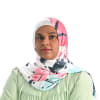MOH to develop guidelines for firms that provide non-clinical genetic testing
Firms offering the tests say they can tell you whether you're at risk of developing certain diseases.

A DNA double helix is seen in an undated artist's illustration released by the National Human Genome Research Institute to Reuters on May 15, 2012. (Illustration: Reuters/National Human Genome Research Institute)
SINGAPORE: A search for genetic testing services online turns up calls to “make smarter choices about your health, family and future” and “uncover your ethnic origins and find new relatives”.
These tests, which can be done at home with a kit, are purportedly able to tell a person a wide-ranging number of things from what they should eat for health reasons to what diseases they may get. The tests are done by analysing a small sample of saliva.
To help consumers and to protect their welfare, the Ministry of Health (MOH) is developing a guide for firms that offer this service.
The guide will give directions to providers in areas like marketing, MOH and the Health Sciences Authority said in a joint reply to queries from CNA on the regulations surrounding such testing.
The guide will provide consumers with the right information to make an informed choice about such non-clinical genetic testing, they added.
“As non-clinical genetic tests are not used for clinical purposes and currently do not present the same degree of potential risks and/or harm, they are not regulated under the Private Hospitals and Medical Clinics Act,” the agencies said.
Nevertheless, they cautioned that non-clinical genetic tests should not be used to assess, diagnose, prevent or treat any health or medical conditions.
"Any results from the test should not be regarded as medical information or advice," the agencies said.
MOH will continue to monitor the developments in commercial genetic tests to ensure the protection of consumers’ safety and welfare, a spokesperson added.
GUIDELINES WILL ENSURE COMPANIES DO NOT MISLEAD CONSUMERS
Mr Michel Mommejat, chief marketing officer and General Manager of Asia at Japan-based genetic testing firm Genesis Healthcare said this will be beneficial, with the increasing interest in genetic science.
“Guidelines will help ensure that companies adhere to the right messaging, and do not mislead consumers. As a result, an open dialogue and education with all stakeholders is a positive development,” he said. The firm started operations here in April 2018.
His firm provides a home test kit that is non-invasive and requires a small saliva sample, he said. The sample is used to analyse details like a person’s predisposition to health-related conditions, body constitution, genetic abilities, genetic behavioral traits as well as information related to skin, diet, and fitness, he said.
“Based on scientific research, it has been established that illnesses can be traced to genes passed down from parents to their child. It also allows people to learn more about how to maximise their workouts, improve their diet or select the right skin care ingredients to better suit them, all based on their unique genetic makeup,” Mr Mommejat said.
Genesis Healthcare, which was founded in 2004 and also provides diagnostic services to medical institutions, has experience working with regulatory bodies, policy makers and ministries in Japan to formulate guidelines and regulatory frameworks, he said.
He added that his firm is “very careful” with how it portrays its products and its messaging and encourages consumers to use its tests as a way of getting to know themselves better. He stressed that all diagnostic matters should be addressed by a consultation with a doctor.
Applications engineer Chee Jianzhi, 32, told CNA that he decided to do such a test while it was on promotion at S$199 because he thought there was “no harm” in it.
He was sent a test kit to his home, and he provided a sample of his saliva and dropped the kit into the mailbox. About five weeks later, he received the results.
His results included the level of health risks he has, which prompted him to go for a check-up.
“At this age, not everyone wants to go doctor for checks thinking nothing is wrong, so this got me to do proper checks so I can have more peace of mind," he said.
The results claimed that he has a high possibility of getting diabetes, so he cut down on sugar.
LIMITATIONS TO DATA ON GENES
Head of the SingHealth Duke-NUS Genomic Medicine Centre Dr Saumya Shekhar Jamuar said that while these tests on ancestral information, kinship, health and disease risks, as well as insights into lifestyle factors, are interesting, there are some limitations.
Data on genes for the South East Asian population is typically underrepresented in global genomic databases when compared to Caucasian populations, said Dr Saumya, citing research that showed that 81 per cent of research subjects were European, with just 19 per cent representing the rest of the world.
Dr Saumya, who is also deputy director (clinical) at SingHealth Duke-NUS Institute of Precision Medicine and senior consultant in the Genetics Service Department of Paediatrics at KK Women's and Children's Hospital, said: “For health and disease risks, gene variants that cause diseases are less well-characterised in the South East Asian population and may not be included in test kits, which means that a 'negative' test result may not completely rule out the possibility of the genetic disease.”
The opposite also holds true, as there may also be false positive results where a ‘positive’ result may not truly reflect an increased risk of developing diseases in the local context, he added.
The lack of data also means that ancestral information generated may be less accurate for South East Asians, he said. He said that evolving scientific literature on how lifestyle factors affect genes means that caution needs to be exercised when using such data to derive insights into lifestyle traits such as nutrition, personality and athletic abilities.
The accuracy of data may vary depending on how the genes are tested, he said.
He urged consumers to practise caution when receiving these results, especially when it comes to health risks.
Mr Chee was aware of what he was getting into, having done research on the tests to get properly educated.
“If you read and you are aware of how it works and what things mean and don’t misinterpret the results, I think it is okay,” he said.














